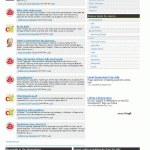Writing for ConservativeHome at the weekend, the Telegraph’s Robert Colville recalls his colleague Rachel Sylvester’s revelation (uh, OK…) that ‘Sir David Varney, Gordon Brown’s adviser on “public service transformation”, supports vast databases to tailor public services to individual need – “a joined-up identity management system” that acts as “a single source of truth” about every individual.’
Whilst I claim no technical expertise on the subject, I’ve long been of the opinion that some kind of centralised – or certainly, joined-up – identity register is inevitable, and indeed desirable. Too often this debate gets confused with identity cards; police stop-and-search powers; or even less helpfully, the War on Terror. It is unquestionably ‘ludicrous’ if, as Rachel Sylvester’s piece noted, ‘somebody has to contact 44 bits of the state when a relative dies.’ It would mean an end to the (alleged) shame of means-testing; those in need would get what they’re entitled to, automatically. But I understand people’s concerns about the security of that single repository of data; if someone cracks your DNA or retina scan, for example, you can’t just replace it like a stolen credit card.
This all comes down to trust – and the truth is, people don’t trust government IT. But government isn’t the only area this kind of ‘crisis of confidence’ affects. Just look at the queues outside Northern Rock branches, the minute people suggested you couldn’t trust that bank’s financial position. The first run on a bank in 150 years, we’ve been told repeatedly.
Banks face exactly the same issue of trust. Every month you hand over all the money you’ve earned to your bank, and you trust them not to lose it. They don’t stash it in a box in their big vault with your name on it. Your personal wealth, or the roof over your head is nothing but a cell in a spreadsheet. The banks’ only currency is trust, trust that they won’t screw up your spreadsheet. Like government data, it’s impossible to secure it 100%. But unlike the government context, the banks have a competitive reason – in fact, a life-or-death reason – to ensure it’s as secure as it humanly, possibly, conceivably can be. Otherwise, the queues will be outside their branches… and you can’t imagine Gordon and Alastair wanting to nationalise another one in a hurry.
Robert Colville’s ConHome piece presents it, wrongly in my view, as a choice between ’empowering citizens’ and ‘amassing information on them’. But I do agree with his point about the ‘decentralising spirit’ of ‘Public Services 2.0’; and that may be the key. Identity data doesn’t necessarily have to be centralised in government; or then again, as technology like OpenID seems to hint, it doesn’t have to be ‘centralised’ at all. Since we all already have a relationship with a bank, aren’t they the natural people to provide this kind of service? After all, what is a bank today other than a provider of a data security service?
